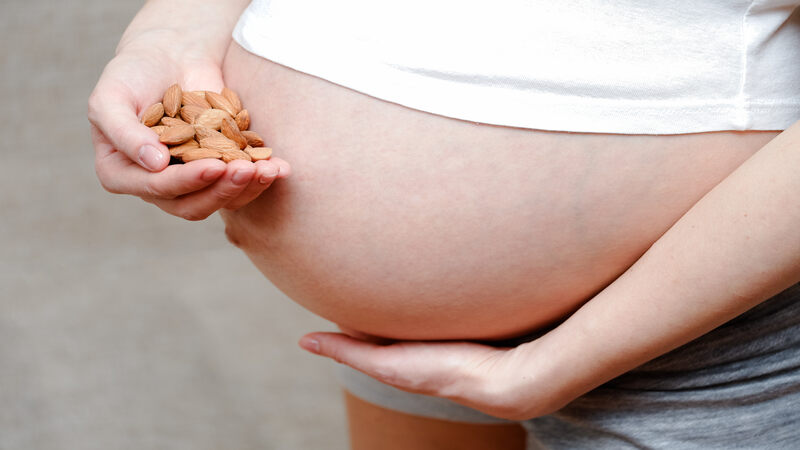 Fasting is an ancient tradition involving keeping away from food for a set time, valued in many religions and cultures for its health and spiritual benefits. Confusion arises if fasting is possible during pregnancy, and rightly so, as proper nutrition is crucial for both maternal health and fetal development.
Fasting is an ancient tradition involving keeping away from food for a set time, valued in many religions and cultures for its health and spiritual benefits. Confusion arises if fasting is possible during pregnancy, and rightly so, as proper nutrition is crucial for both maternal health and fetal development.
Pregnancy is the phase when the mother and growing fetus demand high nutritional value for the well-being of both the mother and the upcoming fetus. Fasting during pregnancy may or may not only lead to nutritional deficiency in the mother but can also result in problems with the growing fetus. Read more about fasting during pregnancy, precautions to take if you decide to fast, and alternatives to fasting.
Is Fasting Safe During Pregnancy?
There is no definitive answer. Limited research exists on how fasting during pregnancy can impact the mother or the growing fetus. However, some studies suggest that babies born to mothers who fasted during pregnancy may experience health issues later in life (1). Fasting may result in headaches, exhaustion, acidity, dizziness (2), and dehydration (3).
Why Do Women Choose To Fast During Pregnancy?

Women may choose to fast for a variety of reasons. Some may be dieting or fasting for weight loss. Pregnant women should avoid fasting for their health and their baby’s well-being (4). It is vital to eat a balanced diet and stay hydrated. If you choose fasting, consulting a healthcare professional is recommended.
Pregnant women usually fast on the following occasions:
1) Karva Chauth Fasting
According to Indian tradition, the wife must perform a Karva Chauth fast, which is believed to increase the husband’s lifespan. (5). However, if you are expecting and want to observe the Karva Chauth fast during pregnancy, there are certain precautions to consider.
2) Navratri Fasting
Some pregnant women choose to fast on Navratri, as this holds great religious, spiritual, and even cultural importance. They believe fasting will bring spiritual benefits, good health, and even a healthy baby.
3) Ramadan Fasting
Like Navratri, pregnant women from the Islamic community choose to fast during Ramadan for religious and spiritual beliefs. While Navratri is observed for 9 days, Ramadan is for a month, and fasting for a month demands proper attention as behavioral responses are not always the same (6).
Is Intermittent Fasting Safe During Pregnancy?

Intermittent fasting is often promoted as a method for losing weight (7). Regardless of your pre-pregnancy weight, it is essential to gain weight during pregnancy to support the healthy development of your baby (8). Your doctor can provide personalized recommendations on how much weight gain is appropriate for you. Fasting can potentially hurt the growth and development of the baby (9). If you have concerns about your weight during pregnancy, it’s important to discuss them with a health expert.
Precautions to Take While Fasting During Pregnancy

When considering fasting during pregnancy, the most important thing to consider is the well-being of both you and your developing fetus. It is essential to consult with your doctor to determine if you are healthy enough to undertake fasting.
- Hydration is crucial—consume enough fluids, especially water, to prevent dehydration. Symptoms of dehydration may include dark urine (10), dizziness, fatigue, headaches, and urinary tract infections (UTIs).
- Prioritize getting enough rest, as you may experience decreased energy levels. Also, organize your daily schedule to include regular breaks.
- Avoid strenuous activity. Refrain from long-distance walking or lifting heavy objects, and steer clear of activities that could lead to fluid loss.
- Consider scheduling more frequent medical checkups while fasting. Your healthcare provider can monitor your health and identify any complications that fasting may exacerbate, such as diabetes or anemia. It’s also advisable to observe weight changes, if any.
- Continue taking your folic acid and vitamin D supplements.
- If you typically consume caffeinated drinks, it is advisable to gradually reduce your intake before fasting to mitigate the risk of withdrawal headaches (11).
Tips For Safe Fasting During Pregnancy

If you are planning to fast, remember to choose your meals well. Do not miss the necessary calorie intake by swapping those snacks and chips with a plateful of fruits and veggies. Likewise, there are some smart tips for safe fasting:
- A balanced pregnancy diet is essential (12) by choosing from a variety of food sources that are healthy. Always break your fast with liquids like fruit juice or any healthy drink.
- Include energy-dense foods rich in complex carbohydrates. Sources such as ragi, jowar, oat or bran-based cereals, beans, pulses, nuts, and seeds will ensure your health throughout fasting.
- Make sure to incorporate sources rich in protein such as cottage cheese, beans, and lentils. These will keep you longer and satisfy your appetite.
- Ensure that you eat healthy before initiating your fast.
- Try to restrict physical activity during fasting as it leaves you tired.
- Hydrate yourself beforehand if fasting is without fluids.
- If you feel weak, break the fast without waiting for a microsecond.
- Go easy with your digestive system while breaking fast. Overburdening your GI tract with loads of food may cause distress.
- Take proper fasting while fasting.
- Steer clear of stressful situations (13).
- Think positively.
How to Break Your Fasting When You Are Pregnant?

Breaking fasting during pregnancy requires careful consideration to ensure the well-being of both your and your growing fetus. There are certain ways you can break your fast when pregnant:
1. Start by hydration
Start your day or meal with a glass of water followed by a warm cup of soup. It helps rehydrate your body and maintain optimal bodily functions, such as temperature regulation and waste elimination.
2. Initiate with a Light Snack
After hydrating, take light snacks such as whole fruit or a handful of nuts. This will begin to reintroduce food to your digestive system without overwhelming it.
3. Hold yourself for 30 Minutes To An Hour
Make sure to give your body enough time to adjust before eating a big meal. Take some time to relax and let your digestive system prepare for a heavier meal. This helps with digestion, reduces discomfort, and ensures that your body absorbs the nutrients properly.
4. Consume a Balanced Meal
Always remember your first larger meal should be balanced and nutritious. Include a source of lean protein, such as chicken or fish, along with some cooked vegetables and a small portion of complex carbohydrates like millets.
5. Stay Hydrated And Listen To Your Body
Strive to drink water at regular intervals, such as when you wake up, with meals, and during breaks throughout the day. Pay attention to your body’s hunger and fullness cues.
6. Resume Back to Normal Eating Schedule
Once you’ve broken your fast and your body has adjusted, you can resume your regular eating schedule. This process allows your digestive system to readjust and helps prevent discomfort or digestive issues.
Warning Signs While Fasting During Pregnancy

When fasting while pregnant, it is crucial to take certain safety measures and recognize any red flags. Some effects are short-term and will go away over time, while others are long-term.
The following are some warning signs that should not be ignored while fasting during pregnancy:
- Fluctuations in body weight (14)
- Reduced urination along with frequent thirst
- Nausea and vomiting
- Headaches, pain in other parts of the body, and fever
- Dark-colored, strong-smelling urine
- Extreme weakness followed by fatigue
When To Consult A Doctor?

Before deciding to fast during pregnancy, it is essential to take guidance from your doctor or midwife. They provide the best advice for the health status of both the mother and the growing fetus. Pregnant women who are fasting should promptly contact them if they experience any of the following issues:
1. Weight Loss
It is generally not advisable for most women to lose weight during pregnancy, as it may pose risks to the developing baby. Regularly monitoring your weight at home and discussing any weight loss with your doctor is recommended.
2. Dehydration
Symptoms of dehydration may include intense thirst, reduced frequency of urination, or dark, strongly scented urine. Dehydration can result in urinary tract infections (UTIs) and other health complications (15).
3. Other Symptoms
You should consult your doctor if you experience dizziness, weakness, headaches, nausea, vomiting, or fever. If you feel dizzy, faint, weak, confused, or tired, cease fasting immediately and consume a sugary beverage with a salty snack.
The decision to fast during pregnancy is personal and depends on the gestational stage. If you are in the first or early second trimester, fasting is only possible after consulting your doctor. Instead of traditional fasting, have a balanced morning meal with protein, coconut water, and fruits to prevent hyperacidity.
FAQ’s
1. Does Fasting Affect Baby During Pregnancy?
Fasting during pregnancy is not recommended due to the increased nutritional needs and the risks of ketosis. Fasting during pregnancy can be challenging.
2. How Long Can You Fast While Pregnant?
Intense fasting is a no-go for pregnant women. The only type of fasting that may be safe for women who aren’t too far along in pregnancy is an overnight fast, for about 12 hours maximum. However doing a 12-hour fast depends on the trimester and complications present.
3. What Does Fasting Do to a Pregnant Woman?
Fasting may make you feel less energetic and dehydrated. During the second trimester of pregnancy, fasting may reduce your risk of developing gestational diabetes and prevent you from gaining weight.
4. Can Fasting During The First Trimester Cause Miscarriage?
During the first trimester, pregnant women have nausea, vomiting, constipation, and low blood pressure. These, however, can increase the possibility of miscarriage. Because of this, fasting is not recommended in the first trimester.
References
- Glazier, J.D., Hayes, D.J.L., Hussain, S. et al. The effect of Ramadan fasting during pregnancy on perinatal outcomes: a systematic review and meta-analysis. BMC Pregnancy Childbirth 18, 421 (2018) – https://link.springer.com/article/10.1186/s12884-018-2048-y
- Indian Journal of Endocrinology and Metabolism 21(1):p 231-237, Jan–Feb 2017. – https://journals.lww.com/indjem/fulltext/2017/21010/Pragmatic_dietary_advice_for_diabetes_during.36.aspx
- Heravian, Javad, Nematy, Mohsen, Yazdani, Negare, Azimi, Abbas, Ostadimoghaddam, Hadi, Yekta, AbbasAli, & Hoseini Yazdi, Seyed Hosein (2015) Comprehensive evaluation of dehydration impact on ocular tissue during Ramadan fasting. Journal of Fasting and Health, 3(1), pp. 11-17. – https://eprints.qut.edu.au/88015/
- H.M Mirghani, D.S.L Weerasinghe, M Ezimokhai, J.R Smith, The effect of maternal fasting on the fetal biophysical profile,International Journal of Gynecology & Obstetrics, Volume 81, Issue 1, 2003, Pages 17-21, ISSN 0020-7292, – https://www.sciencedirect.com/science/article/abs/pii/S0020729202003983
- Reena Kapoor, University of Delhi (2022). Karvachauth: A Celebration with Fasting for Husband’s Long Life. – https://www.researchgate.net/publication/357768484
- Visioli, F.; Mucignat-Caretta, C.; Anile, F.; Panaite, S.-A. Traditional and Medical Applications of Fasting. Nutrients 2022, 14, 433 – https://www.mdpi.com/2072-6643/14/3/433
- Song DK, Kim YW. Beneficial effects of intermittent fasting: a narrative review. J Yeungnam Med Sci. 2023 – https://www.ncbi.nlm.nih.gov/pmc/articles/PMC9946909/
- Flanagan EW, Kebbe M, Sparks JR, Redman LM. Assessment of Eating Behaviors and Perceptions of Time-Restricted Eating During Pregnancy. J Nutr. 2022 Feb 8;152(2):475-483 – https://www.ncbi.nlm.nih.gov/pmc/articles/PMC8826837/
- Reyn van Ewijk, Long-term health effects on the next generation of Ramadan fasting during pregnancy, Journal of Health Economics, Volume 30, Issue 6, 2011, Pages 1246-1260, ISSN 0167-6296 – https://www.sciencedirect.com/science/article/abs/pii/S0167629611001081
- American Pregnancy Association, Dehydration During Pregnancy – https://americanpregnancy.org/womens-health/dehydration-pregnancy/
- Karima R. Sajadi-Ernazarova; Jackie Anderson; Aayush Dhakal; Richard J. Hamilton.Drexel University College of Medicine, OBH-Interfaith Medical Center, Drexel University- https://www.ncbi.nlm.nih.gov/books/NBK430790/
- Plećas, Draga & Plešinac, Snezana & Vucinić, Olivera. (2014). Nutrition in Pregnancy: Basic Principles and Recommendations. Srpski arhiv za celokupno lekarstvo. 142. 125-30. 10.2298/SARH1402125P. – https://www.researchgate.net/publication/261253490
- Stapel, B., Fraccarollo, D., Westhoff-Bleck, M. et al. Impact of fasting on stress systems and depressive symptoms in patients with major depressive disorder: a cross-sectional study. Sci Rep 12, 7642 (2022). – https://www.nature.com/articles/s41598-022-11639-1
- Fernando HA, Zibellini J, Harris RA, Seimon RV, Sainsbury A. Effect of Ramadan Fasting on Weight and Body Composition in Healthy Non-Athlete Adults: A Systematic Review and Meta-Analysis. Nutrients. 2019 Feb 24;11(2):478. – https://www.ncbi.nlm.nih.gov/pmc/articles/PMC6412279/
- British Heart Foundation, Dehydration: signs, causes, and tips to drink more water –https://www.bhf.org.uk/informationsupport/heart-matters-magazine/medical/signs-of-dehydration
